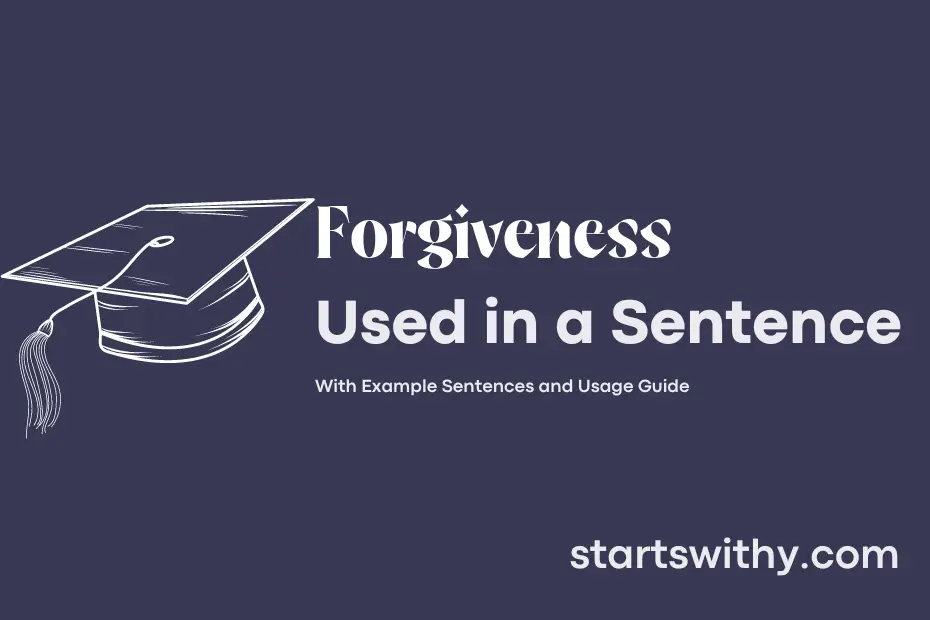Have you ever found it difficult to let go of resentment and anger towards someone who has wronged you? Forgiveness, the act of pardoning or excusing someone for a mistake or offense, can be a powerful tool in achieving peace and healing in our relationships and within ourselves.
Forgiveness is a deliberate decision to release feelings of resentment and vengeance towards a person or group who has harmed you. It does not necessarily mean forgetting the wrongdoing or condoning the behavior, but rather choosing to let go of negative emotions and move forward without holding onto grudges.
7 Examples Of Forgiveness Used In a Sentence For Kids
- Forgiveness means letting go of anger.
- When we say sorry, we ask for forgiveness.
- It’s important to show forgiveness to our friends.
- We should always be ready to offer forgiveness to others.
- Forgiveness brings peace and happiness.
- Let’s practice forgiveness by sharing and caring for one another.
- Showing forgiveness makes us kind and loving.
14 Sentences with Forgiveness Examples
- Forgiveness can help college students let go of grudges and move forward in a positive direction.
- It is important for students to practice forgiveness towards themselves for any mistakes they may have made during their academic journey.
- Seeking forgiveness from professors or classmates for any misunderstandings or miscommunications can help maintain healthy relationships within the college community.
- Forgiveness allows students to release anger and resentment, leading to a healthier mental state and improved overall well-being.
- Asking for forgiveness after unintentionally hurting someone’s feelings shows maturity and empathy among college students.
- Offering forgiveness to a friend who has made a mistake can strengthen the bond between friends and cultivate a culture of understanding and support.
- Showing forgiveness towards group members for any shortcomings can foster a collaborative and harmonious working environment during group projects.
- Accepting forgiveness from others when we make mistakes is equally important as offering forgiveness to others in a college setting.
- Granting forgiveness to oneself for not meeting personal expectations academically allows for self-growth and learning from past experiences.
- Seeking forgiveness from mentors or advisors for missing deadlines or appointments showcases responsibility and accountability in a student’s academic journey.
- Expressing forgiveness towards a roommate for a past disagreement can create a peaceful living environment conducive to studying and personal growth.
- Embracing forgiveness towards past failures or setbacks can empower students to persevere and strive for success in their academic pursuits.
- Cultivating a culture of forgiveness within college clubs or organizations can promote unity and collaboration among members.
- Demonstrating forgiveness towards oneself for not achieving perfection in all aspects of college life can alleviate unnecessary stress and pressure.
How To Use Forgiveness in Sentences?
Forgiveness is the act of pardoning or letting go of resentment towards someone who has wronged you. Here is a basic guide on how to use “Forgiveness” in a sentence for beginners:
-
Identify the person or situation for which you need to offer forgiveness. For example, “I need to practice forgiveness towards my friend who betrayed my trust.”
-
Remember that forgiveness is a choice you make for your own well-being, rather than condoning the actions of the person who hurt you. For instance, “I choose to grant forgiveness to my coworker who spread rumors about me.”
-
Formulate your sentence using forgiveness as the main word. For example, “I am working on finding forgiveness in my heart for my sibling who stole from me.”
-
Reflect on how forgiveness can bring peace and healing to your own heart. For instance, “By offering forgiveness to my ex-partner, I am releasing the anger and pain I have been holding onto.”
-
Practice empathy and understanding when using the word forgiveness in a sentence, acknowledging the humanity of both yourself and the person you are forgiving. For example, “I extend forgiveness to my parent for their harsh words, recognizing that we all make mistakes.”
Remember, forgiveness is a powerful tool that can help you let go of negative emotions and move forward in a healthier way.
Conclusion
In relationships, sentences with forgiveness are crucial for healing wounds and moving forward. They serve as bridges to repair damaged connections, allowing individuals to let go of resentment and embrace reconciliation. When someone acknowledges their mistakes and seeks forgiveness through words like “I’m sorry,” “Please forgive me,” or “I understand how my actions hurt you,” it can convey a genuine desire to repair the relationship and demonstrate their willingness to mend what was broken.
Forgiveness in sentences not only offers relief and closure to the one seeking it but also provides an opportunity for growth and strengthening of bonds between individuals. The act of forgiveness, reflected in words and actions, promotes healing, fosters empathy, and nurtures trust in relationships, ultimately paving the way for a healthier and more positive connection between people.



